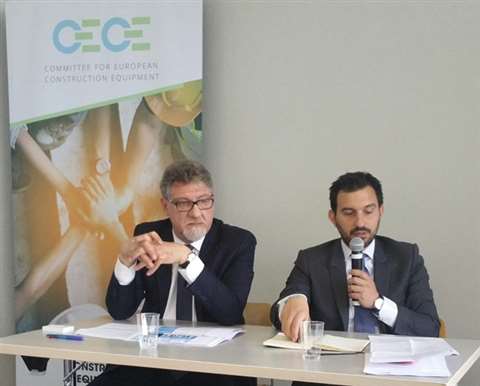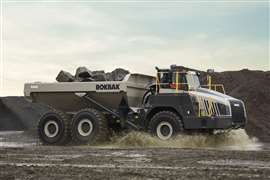CECE expects sales growth
30 April 2018

Sales of construction equipment in Europe grew by 15% in 2017, and in the first three months of this year, sales continued to grow, according to CECE (the Committee for European Construction Equipment) at the Intermat show in Paris, France, last week.
CECE said it expected another 5% to 10% increase in Europe during 2018, with some markets experiencing historically high-levels of sales, and marking the fifth consecutive year of market expansion.
Enrico Prandini, CECE president, said, “This is a very good economic environment for Intermat to take place.”
He added that the trade show would definitely give the companies another push, especially from customers from the booming French market and the French communities in the MENA (Middle East, North Africa) region. Isabelle Alfano, director of Intermat, who was optimistic about the show, confirmed Prandini’s estimate.
The main findings of the CECE annual economic report were presented in a new animation video.
Prandini pointed out, though, that one of the inhibiting factors to the industry’s success was the limited amount of market surveillance.
It was pointed out that construction machines were still coming to the European Union and were in use in there without fully complying with the relevant legislative framework.
Once again, CECE and CISMA – the French construction equipment industry association – carried out their usual market surveillance tour in the closed halls of Intermat on Sunday.
Experts checked over 45 different machines from 29 different brands, recording a 25% rate of non-compliance with EU-applicable regulation.
The lack of compliance occurred in the areas of accessibility, visibility and handling, and therefore mainly concerned the safety of operators.
Prandini stressed that these instances were too many, saying, “Market surveillance is an essential pillar of the internal market – without appropriate controls on compliance, requirements are of very little value.”
He continued to say that CECE, therefore, welcomed the EU Commission’s recent Goods Package proposal to reinforce trust in the Single Market. It aims to strengthen compliance and enforcement of EU product rules and mutual recognition.
Also at Intermat, CECE hosted Barbara Bonvissuto, head of unit for advanced engineering at the European Commission, and MEP Anne Sander, member of the economic affairs committee of the European Parliament.
Riccardo Viaggi, secretary general of CECE, said, “We gave them the opportunity to get a better picture of the European high-tech construction equipment industry, its efficiency and technological standards, as well as the challenges it sometimes faces coming from European regulation that is not always business-friendly.”
Major challenges
One of the priorities in Prandini’s two-year presidential mandate is to tackle the industry’s three major challenges of the future – rapid technological changes, digital construction, and mismatch between skills, jobs and education in Europe.
He said, “It absolutely makes sense to join forces with the customers and their representative European associations, to find solutions along the value chain. This will be a major key factor for success in the future.”
Creating a common vision will also be the theme of the CECE Congress, held every two years. As Italy currently holds the CECE presidency, the Congress will be held in Rome, from October 17 to 19.
Also in Rome, the results of the CECE digitalisation project will be presented, according to Viaggi.
CECE has tasked a consulting team with the aim of providing a detailed report about the state, the tendencies, the conditions and the blocking factors of digitalisation of the construction sector. CECE said this should help to understand the level of digitalisation that future construction machinery would need. This will be based on the requirements from construction companies.
Viaggi said that the report would act as a compass for construction equipment manufacturers. He added that his association was following the main recommendations of the McKinsey 2016 study to push for a global value-chain approach.
“We want to be the leader of these changes,” said Viaggi.
European elections
The political year in Brussels will be mainly affected by the European elections in the spring of 2019.
Prandini said, “In this framework, we should seize the opportunity to gain more visibility, attention and impact.”
In the run-up, CECE will also issue a political manifesto to guide the choices and the priorities of the next European legislature. CECE will keep promoting the idea of fair competition and free trade for all market players in Europe and globally.
“We will call on sensible evidence-based and innovation-enabling regulation. What we have to avoid is unneeded complexity in laws and regulations”, said Prandini.




